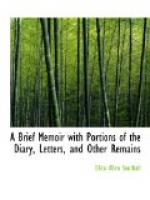The page my unapt heart has learn’d
so newly
In the dark lessons which
afflictions teach—
Oh, it were vain to try to utter truly
In the cold language of unapter
speech.
That hearts when thus their very depths
are burning
Alone should know their bitterness,
is well;
But, oh, my heart more joys than aches
in learning
Another lesson, would that
words could tell.
New depths of love in measure unsuspected,
Ties closer than I knew, were
round my heart;
And half I thank the wrench that has detected
How thoroughly and deeply
dear thou art.
And ’twas to tell thee this that
I have taken
The tuneless lyre I thought
to use no more,
Yet once at thy returning may it waken,
Then sleep forever, silent
as before.
And not more narrow than the dome of ether
Beams heaven’s unbounded,
earth-embracing scroll;
Then be it thine and ours to read together
Of Him who loves not less
than rules the whole.
And not more slow than was the bark that
bore thee
To an untried and dimly-distant
land—
Our hearts’ affections thither flew
before thee,
And now are ready waiting
on the strand.
—8th Month, 1845.
10th Mo. 1st. Much struck with the suitability of the expression, “under the yoke,” truly subjugated. not merely offering this or that, but being offered “a living sacrifice.” Oh for a thorough work like this! This is “when the yoke Is easy and the burden light.” I know almost nothing of it by experience, but think it is “now nearer than when I first believed.” For a day or two I have been given to desire it earnestly.
10th Mo. 12th. Evening. Many thoughts about faith in Christ. But oh for the reality, the living essence of it! We can be Christians, not because we believe that the blood of Christ cleanses from sin, but because we know the blood of Christ to cleanse us from sin.
About this date, in the diary of daily affairs, is the following:—
“A conviction has come upon me that, in all respects, now is the time to reform, if ever, the course I am now pursuing. Religion, the main thing, may it ever more be the main object; and then, as to moral, social, and other duty, oh, be my whole course reformed. ... From this time forth may I nightly ask myself these five questions. 1. Has my employment and economy of time been right? 2. Has my aim been duty—not pleasure? 3. Have I been quiet and submissive? 4. Have I looked on the things of others as my own? 5. Have propensities or sentiments ruled? I wish to give an answer, daily, to each; and now say for yesterday. 1. Some wasted time before dinner. 2. Pretty clear, 3. No temptation. 4. Pretty well. 5. Pretty [well] except at meals.”
In this concise and simple manner are these questions answered, almost daily, throughout the year, until, “finding that daily records of employment are of little use, and that the intellectual and spiritual could not well be longer separated,” she discontinued the practice, and recorded in the same book “any thing in either line that seemed fit to reserve from oblivion.”




